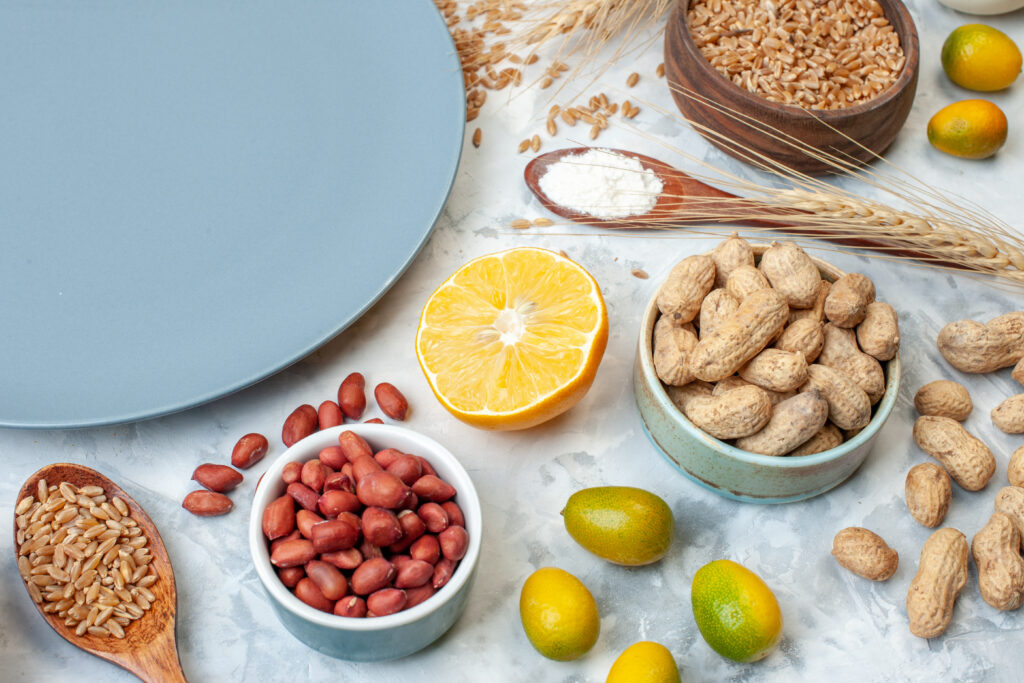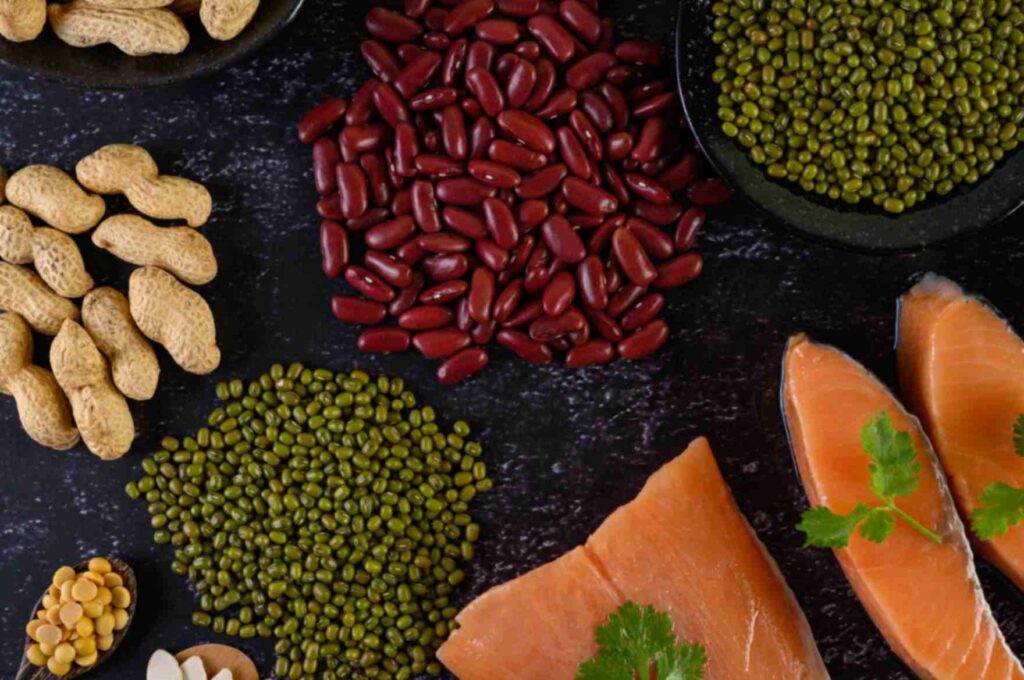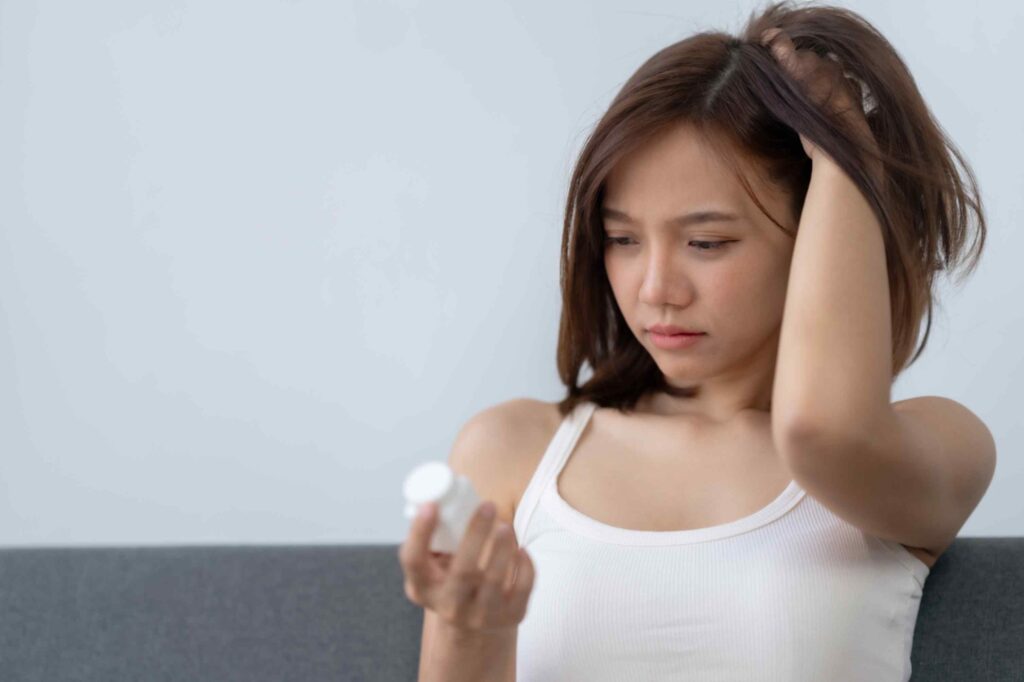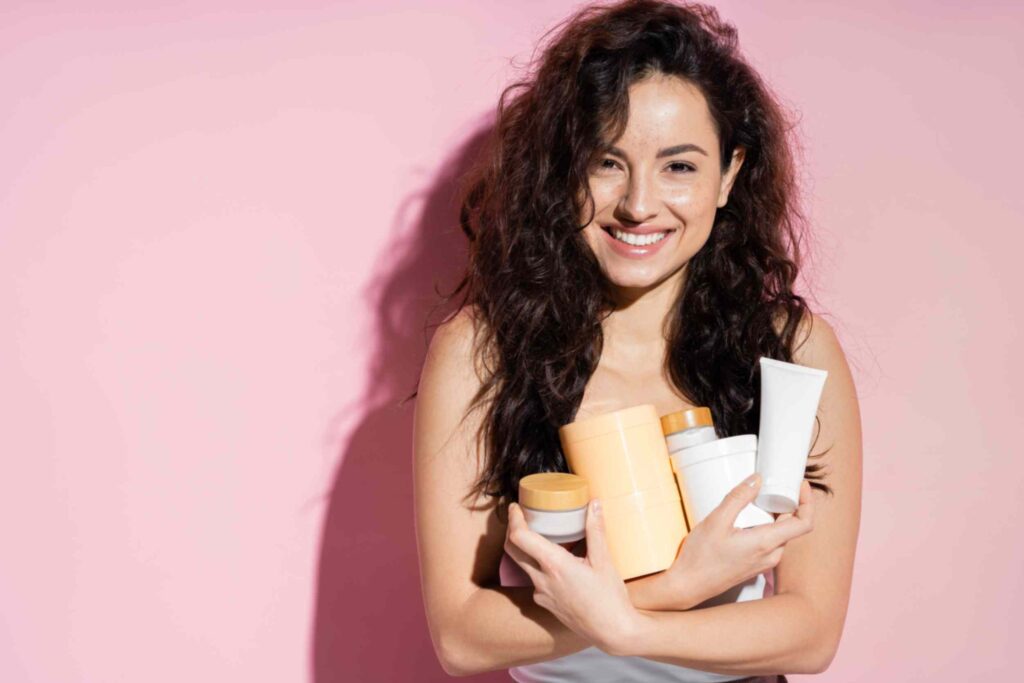Also Read In: Hindi | Tamil | Kannada | Telugu | Bengali | Malayalam
We all have heard of biotin at once in our lives. If you are an attention-to-detail kind of person, you might have noticed that the shampoo or serum commercials do mention biotin as an ingredient in their products.
But what is biotin? In as simple words as we can describe, biotin is a B vitamin that is B7. For both humans and other organisms, it’s involved in a variety of metabolic processes. The primary processes out of these are the utilization of carbohydrates, fats, and amino acids.
Biotin is found naturally in a variety of foods such as milk, eggs, and bananas. But is it that significant? Well, the answer is yes because if the body is biotin deficient, problems like hair thinning and face rashes can happen. Also, if you want to make sure that your body is actively breaking down carbs, fats, and other substances, biotin must be present in adequate numbers.
Curious to read more about biotin? Let’s dial ourselves in.
Role of Biotin in the Body
Biotin is more of a water-soluble B vitamin. What’s special about it is that it plays a lot of roles in the body ranging from energy metabolism to gene regulation to carbohydrate and amino acid metabolism, etc.
When it comes to the metabolism of amino acids, fatty acids, and glucose, biotin acts as a coenzyme. It makes sure that these nutrients are converted into energy and the rest of the bodily functions are maintained properly.
Biotin is also part of gene expression regulation. How it goes around doing it is by assisting the transcription of certain genes. Further down the road, this plays a role in the growth of cells and their development.
The breakdown of carbohydrates into glucose is done with the help of biotin. This one is important because carbs are used as the primary source of energy by the body. Further, biotin also helps in breaking down the amino acids. Amino acids are building blocks of proteins, which need to be broken down further so that they are available for multiple necessary bodily functions.
Another big role of biotin is to support the skin, hair, and nail health of the body. It aims to promote healthy skin and hair. And that’s the primary reason behind it being a common ingredient in many skin and hair products.
Benefits of Biotin
There are many benefits of biotin and there’s no doubt about that. Let’s touch base on all the important benefits one by one:

Biotin for Hair Growth
Biotin is often touted as the go-to essential when it comes to growing hair. It’s wondrous given the properties that it brings to the table. What’s special with biotin when it comes to hair health is that it promotes hair growth and strengthens the hair roots more than any other ingredient could do.
A recent study conducted showed that biotin supplementation helped with strengthening the hair strands that were thinning over time. Moreover, biotin also helps in the production of keratin. Now keratin is an important protein that makes sure that the hair remains thicker and healthier all along. Also, biotin supplementation helps in reducing the hair loss that is being caused due to external factors. It promotes regrowth. The regrowth will be faster in people who are suffering from biotin deficiency.
Biotin for Skin and Nails
Not just hair growth or hair health, as discussed earlier biotin is beneficial for multiple aspects of human body. Research says that it is also beneficial for the skin. Biotin is a popular ingredient and has been widely used for a long time to make sure that the skin is healthy. How it does that is by improving the metabolism of the fats in the body. This metabolism is important so that the skin stays toxin-free. Therefore, whenever you suffer from skin conditions such as acne and dermatitis, it’s to biotin-up the levels in your body.
Study shows that biotin and nails are correlated. Most people aren’t aware of this but if you’ve got bad nail health, biotin can be the solution. Biotin acts in such a way that it strengthens the nails. It also reduces the brittleness of the nails, prevents the nails from splitting, and makes sure that they are not easily breakable. If biotin is regularly consumed in the form of oral supplementation, it will lead to thicker and healthier nails.
Biotin for Parenting
Yes, that’s true. As unique and out of the box as it may sound it is indeed the go-to supplement for pregnant women. What biotin actually does is it supports the development of the fetus during pregnancy and study confirms this. It makes sure that the level of biotin is adequate in the body so that no birth defects are faced, and healthy growth of the fetus is there. Also, after childbirth, biotin continues to support the mother and help in recovering the body post-pregnancy. It makes sure that the overall energy levels are maintained in the body and mother is able to combat fatigue more effectively.
Biotin for Metabolism
That happens at molecular levels. Biotin is an important ingredient that helps big time in breaking down food and converting it into ATP or say energy. It fills the boots of a coenzyme, and its action is to be part of the metabolism of fats, carbohydrates and proteins. All this makes sure that optimum levels of energy production are being done in the body.
After adequate levels of energy production are achieved in the body with the help of biotin, what comes next is the enhancement of metabolism. Biotin supports the metabolic processes and brings about healthy metabolism. Now this is what is crucial for weight management and overall energy balance.
Biotin for Lowering Blood Glucose
Another important benefits of biotin. Study suggests that biotin when it acts with other B vitamins helps in regulating the glucose levels in the blood. What’s more, is that it enhances glucose utilization in the body and improves the sensitivity of insulin. Therefore, this indicates that biotin can be helpful for individuals with type 2 diabetes.
Other Biotin Benefits
Biotin also supports the human body with its cognitive functioning. It aids in the production of neurotransmitters. These neurotransmitters are essential for better functioning of the brain and enhanced mental clarity.
Apart from cognitive functioning, cardiovascular health (which is by far one of the most important things for the human body) is where biotin helps more than we can imagine. Biotin makes sure that bad cholesterol levels are lower in the body and that healthy blood is circulated throughout.
Moreover, mood and emotional health are where biotin acts. If you have a better mood and optimum emotional well-being, the biotin levels in your body are adequate. If the mood is great and you are emotionally fine, it will help you out with the perfect functioning of the nervous system and also prevent problems such as anxiety and depression.
Natural Sources of Biotin
There are a lot of biotin-rich foods that are natural, healthy, and beneficial to eat. You can add biotin in diet with the help of following foods:

- Organ Meats
Organ meats like liver and kidney are one of the most biotin-rich foods. And not just biotin or B7 vitamin, organ meats are also rich in other essential nutrients.
- Yeast
Nutritional and brewer’s yeast is the best type of yeast if you are looking for biotin. These yeast types are excellent sources of biotin. Whether use them as recipes or dietary supplements, you will get a great amount of biotin from them.
- Egg Yolks
Another great source of biotin is egg yolks. But you should be cautious while consuming them and make sure that you always cook them and then eat them. Unless you’ll be at risk of avidin.
- Cheese
There are many types of cheese that contain biotin. And given cheese is a tasty food to eat, you’ll have a fun type while taking in your biotin needs.
- Legumes
Soybeans and peanuts have the highest amount of biotin when it comes to legumes. And not just biotin, they are also rich in protein levels, which eventually support the overall nutritional levels of the body.
- Leafy Greens
Often overlooked leafy greens are one of the greatest sources of biotin. Spinach and kale are the best ones to go for. They are nutritious, healthy, and have a modest amount of biotin present in them.
- Cauliflower
Cauliflower is a versatile source of biotin. It’s easily available. It tastes good. And it easily fits into various recipes and dishes.
- Mushrooms
There are a lot of varieties that contain biotin. Like button mushrooms. Apart from biotin, they also add flavor and other essential nutrients to the meals.
- Nuts and Nut Butter
Nuts such as walnuts and almonds have high amounts of biotin in them. Also nut butters are a great alternative to these. Apart from biotin, they also provide essential protein and fats to the body.
Symptoms of Biotin Deficiency
Biotin deficiency is a problem, and things can become serious if it’s not addressed on time. There are signs and symptoms of biotin deficiency. If you’re able to identify these, you can act immediately towards replenishing the biotin levels. Here are those symptoms:

Hair Thinning
Gradual reduction in hair density, making the scalp more visible is one of the symptoms of biotin deficiency. Insufficient biotin disrupts the production of keratin, a key protein for hair strength.
Hair Loss
Another symptom is significant hair shedding and potential bald patches. Without adequate biotin, hair follicles weaken, leading to increased hair fall.
Brittle Nails
When there’s biotin deficiency in the body, nails become thin, weak, and prone to splitting or breaking. Biotin is essential for keratin production, which supports nail health.
Skin Infections
Increased susceptibility to bacterial and fungal infections indicates that there’s a biotin deficiency in the body. Biotin supports skin barrier function; deficiency can compromise the skin’s ability to fend off pathogens.
Neurological Issues
Symptoms may include depression, lethargy, hallucinations, and numbness or tingling in the extremities. Biotin is crucial for nervous system health; its deficiency can impair nerve function.
Decreased Muscle Tone (Hypotonia)
Often overlooked but reduced muscle strength and tone, leading to floppiness in muscles is also a sign of low biotin levels in the body. Biotin and metabolism work in sync, and its deficiency can affect muscle function.
A Red, Scaly Rash (Seborrheic Dermatitis)
Often appears around the eyes, nose, mouth, and other body creases. Biotin deficiency affects skin health, leading to dermatitis.
Conjunctivitis (Pink Eye)
Biotin deficiency causes inflammation or infection of the conjunctiva, which leads to redness and irritation. Biotin deficiency can impair immune response, increasing the risk of infections.
Developmental Delays in Infants
Slowed physical and cognitive development in babies and young children is also a sign of biotin deficiency. Biotin is vital for growth and development, and its deficiency can hinder these processes.
Loss of Appetite and Nausea
Reduced desire to eat and feeling sick tells that you are biotin deficient. Biotin deficiency can affect metabolic processes, leading to digestive issues.
Dry Eyes
Irritated, dry, and uncomfortable eyes are also a sign of biotin deficiency. Biotin is essential for overall skin and mucous membrane health, including the eyes.
You Might Like: What is Collagen: Types, Sources, Benefits for Skin, Joints, and More
How To Diagnose and Treat Biotin Deficiency?
There’s a combination of both clinical evaluation and lab tests required for diagnosing biotin deficiency. All this includes:

Clinical Evaluation
Clinical evaluation is done and should only be done under a certified healthcare provider’s supervision. The healthcare provider essentially looks for symptoms that indicate a biotin deficiency in the body. These symptoms of biotin deficiency can be hair loss, brittle nails, skin rashes (especially around the eyes, nose, and mouth), conjunctivitis, and neurological symptoms (depression, lethargy, hallucinations, numbness, and tingling in the extremities).
Dietary Assessment
The next thing that’s involved in the diagnosis is the assessment of dietary patterns. The healthcare asks what the patient eats throughout the day. It’s important to identify the deficiencies. Also, some foods tend to inhibit biotin absorption (e.g., excessive consumption of raw egg whites), which is identified by the healthcare provider.
Laboratory Tests
Then comes the lab testing. The following tests are recommended to diagnose biotin deficiencies in the human body:
Blood Tests
This one is a straight forward approach as blood tests measure the biotin levels directly. However, these tests are complex and due to this complexity, they are not performed commonly.
Urine Tests
A urine test for biotin deficiency is common. They aren’t that complex and can check the abnormal levels of 3-hydroxy isovaleric acid, which indicates biotin deficiency in the body.
Genetic Tests
There are some cases where biotin deficiency happens due to genetic conditions. That’s when genetic tests come in. An example of a genetic condition that leads to biotin deficiency is the biotinidase deficiency.
Power of Incorporating Biotin with Other Ingredients
Biotin with Rosemary
- Hair Health: Biotin strengthens hair, while rosemary stimulates scalp circulation and reduces hair loss. Together, they promote thicker, healthier hair.
- Scalp Health: Biotin improves scalp integrity; rosemary’s antimicrobial properties maintain a healthy scalp, reducing dandruff.
Biotin with Collagen
- Skin Health: Biotin enhances hydration; collagen improves elasticity. Combined, they reduce wrinkles and improve skin texture.
- Nail Health: Both strengthen and support nail growth, reducing brittleness.
Biotin with Hyaluronic Acid
- Hydration: Biotin maintains moisture levels, while hyaluronic acid attracts and retains moisture. Together, they provide deeply hydrated, plump skin.
Biotin with Vitamin E
- Antioxidant Protection: Biotin supports health, and vitamin E protects against oxidative damage. Combined, they enhance skin and hair protection and reduce aging signs.
Biotin with Aloe Vera
- Soothing and Healing: Biotin supports skin integrity, and aloe vera soothes and heals. Together, they calm and hydrate the skin.
Biotin with Tea Tree Oil
- Anti-Acne: Biotin supports skin health; tea tree oil treats and prevents acne. Combined, they promote clearer skin.
Biotin with Argan Oil
- Nourishment: Biotin strengthens hair and skin; argan oil nourishes and moisturizes. Together, they enhance texture and health.
Biotin in Skincare and Haircare Products
There are many skincare and haircare products that are biotin-rich. The benefits of using these products are improving the health of the skin, hair, and nails. Let’s have a look at how these products utilize biotin in them:

Biotin in Skincare Products
Moisturizing Creams and Lotions
Biotin-infused moisturizers are good for a healthier skin. They make the skin more resilient. Moreover, dryness and flakiness of the skin go away if you are a regular user of biotin-based moisturizing creams or lotions. Biotin helps in the improvement of the texture and hydration of the skin. What it does is support the lipid barrier of the skin and help it to retain moisture, therefore, making the skin supple and soft.
Anti-Aging Products
Anti-aging products utilize biotin because biotin has the capability of performing healthy skin cell turnover. In simple words, it makes sure that the skin is youthful and has a great even skin texture. Apart from skin cell turnover, biotin also helps in the regeneration and repair of skin cells. Therefore, all this contributes to reducing signs of aging and keeps the fine lines and wrinkles away.
Acne Treatments
A variety of acne treatment skincare products have biotin present in them. It’s because biotin makes the skin better equipped to heal and recover from acne breakouts. It reduces the chances of scarring and blemishes. Further, when acne breakouts are controlled, biotin’s role to support overall skin health starts.
Biotin in Haircare Products
Shampoos and Conditioners
Biotin-enriched shampoos and conditioners have biotin in them only because it is meant to strengthen the hair and improve its elasticity and resilience against external factors. If you use shampoos that contain biotin, the chances of hair breakage, hair thinning, and frizziness will decrease.
Hair Masks and Treatments
Biotin present in hair masks is meant to provide deep nourishment to the hair strands. It makes sure that the scalp is hydrated, the hair is string, and the hair is more vibrant than ever.
Hair Growth Serums
Biotin is a mainstay when it comes to hair growth serums. The role is big – it promotes the production of keratin in hair, which is essential for hair growth. Also, hair serums that have biotin in their composition help stimulate hair growth, increase the density of hair, and reduce the thinning of hair.
Best Biotin Products
Strong Hair Gummies with Biotin
- Contains 5000 mcg of biotin per serving, along with other hair-supporting nutrients like ceramosides, amla, and vitamins
- Positive customer reviews reporting stronger, thicker, and shinier hair

Ayurvedic Biotin Capsules from Sesbania agati
- Made with natural Sesbania agati (500mg) to support hair and skin health
- Vegetarian, gluten-free, and free of harmful additives

Scientific Research on Biotin
There have been many extensive research and studies done to find the efficacy and benefits of biotin. Here are some of the most notable ones:
Biotin and Diabetes Management
- Studies on animals suggest biotin may help reduce blood sugar levels, total cholesterol, and blood fats in people with diabetes. However, more research is still needed to confirm these effects in humans.
Biotin and Pregnancy
- Animal and in vitro studies have suggested biotin’s importance in early embryo development. Biotin deficiency during pregnancy has been linked to birth defects in the neural tube.
- One study found an association between maternal biotin concentration and the risks of preterm birth and fetal growth issues.
Biotin and Hair, Skin, Nail Health
- While biotin deficiency can lead to hair loss, brittle nails, and skin problems, the evidence is limited on whether biotin supplements can improve these conditions in people without deficiencies. More research is still needed in this area.
The Bottom Line
Biotin is one of the most important vitamins. Also known as the B7 vitamin, biotin is beneficial for a variety of reasons. It helps with hair growth. It helps with nail health. It makes the skin look more radiant and glowing. At a molecular level, biotin plays a major role in making sure that the metabolic activities of the human body are running optimally.
Also, biotin helps with the breakdown of essential nutrients such as proteins, carbohydrates, and fats. What’s more, is that biotin makes sure that the energy production cycle of the body is running great and optimum levels of energy are being produced.
Biotin is a must-have vitamin. It can be consumed with the help of various biotin supplements and natural foods such as egg yolks, nuts, walnuts, seeds, cheese, etc. Also, there are some skincare and haircare products that help fulfill the necessity of biotin.






